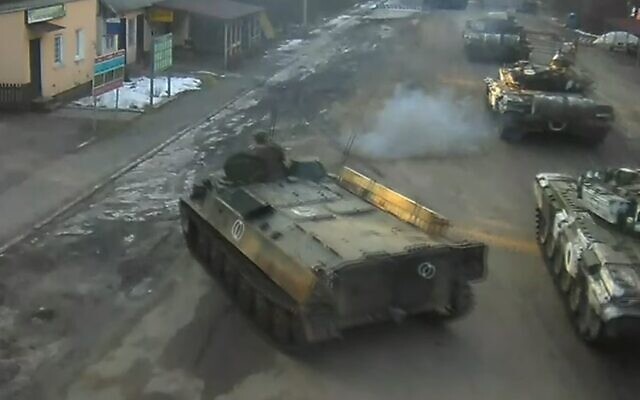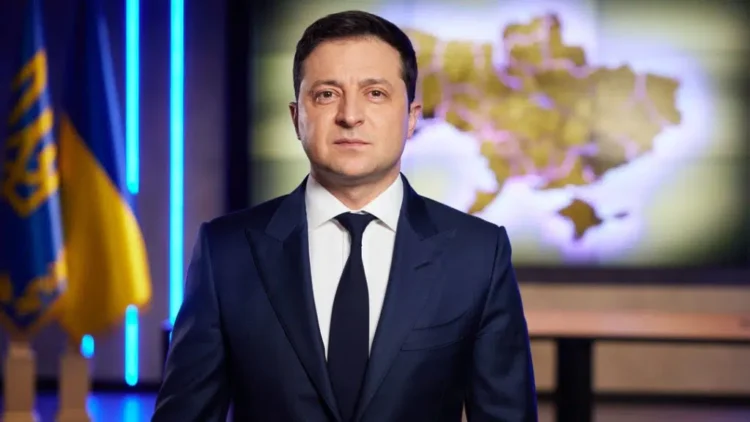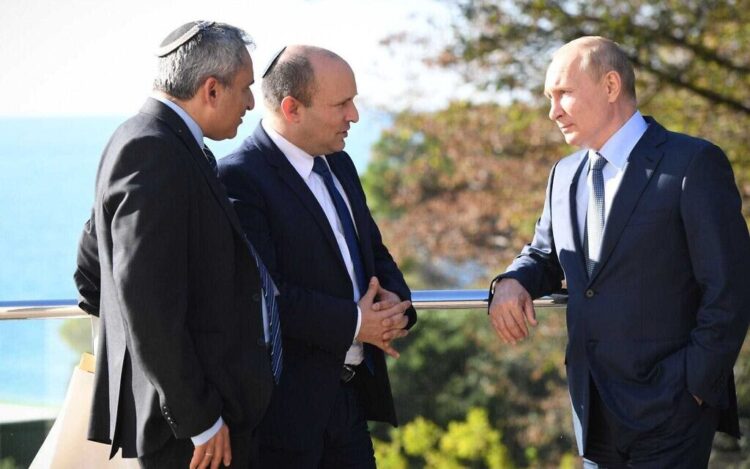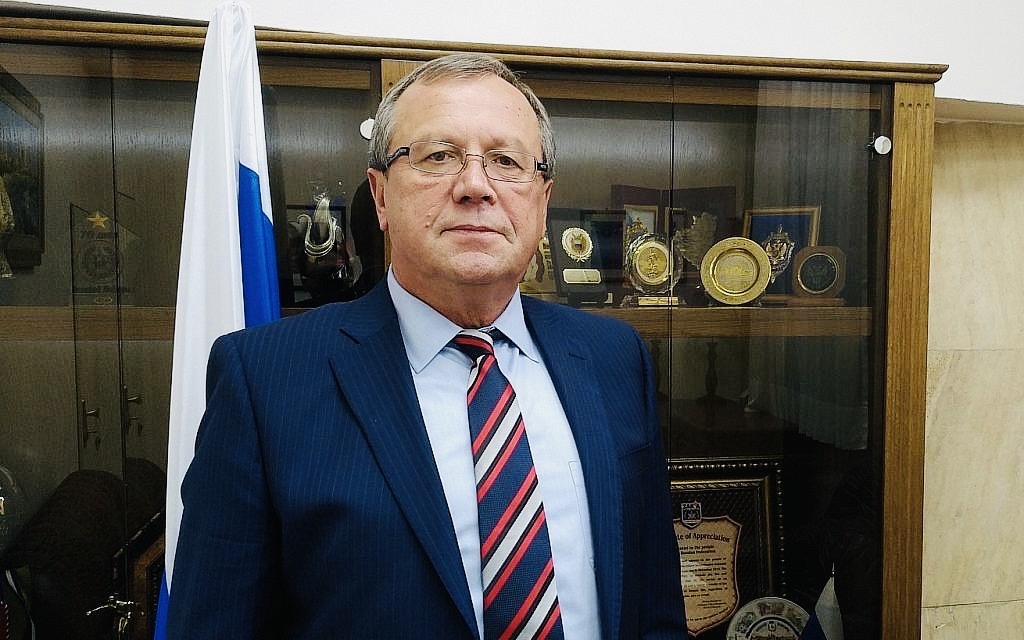A day after Russia’s invasion of Ukraine on February 24, the Russian ambassador to Israel, Anatoly Viktorov, issued several comments on Israel’s policy vis-a-vis the current crisis.
“We took note of Israel’s position,” he told the Times of Israel in an interview. “Our Israeli colleagues have repeatedly spoken about their concern for the safety of their citizens and the Jewish community in Ukraine. At the same time, we hope that they will stay wise and diplomatic and continue our joint work for the benefits of our countries and peoples.”
He then cautioned Israel to refrain from joining Western countries in bashing Russia in “a new kind of sport.”
As Viktorov himself might agree, Israel has so far followed his advice, having been extremely careful in its official reaction to Russia’s invasion.
Ukrainian Jewish immigrants in Israel recently condemned Russia in a demonstration in front of the Russian embassy in Tel Aviv. And Natan Sharansky, the former human rights activist and Israeli government cabinet minister, has urged Israel to take “a clear moral stand” against the invasion, calling it a challenge to “all the basic principles of the free world.”

But in general, the Israeli government has bent over backwards to avoid antagonizing Russia, a major power in the Middle East.
A couple of days before Russian tanks stormed into Ukraine, Israel issued a formulaic announcement supporting Ukraine’s “territorial integrity.” Yet on the first day of the war, Israeli Foreign Minister Yair Lapid went further, blasting Russia’s invasion as “a grave violation of the international order.”

Russia was quick to respond to Lapid’s criticism. Its delegation at the United Nations expressed “concern” about Israel’s “settlement activity” on the Golan Heights, which was conquered by the Israeli army during the final phase of the 1967 Six Day War. “Russia does not recognize Israeli sovereignty on the Golan Heights, which are part of Syria.”
Having taken note of Russia’s brusque communique, Israeli Prime Minister Naftali Bennett adopted a much more conciliatory approach, not even mentioning Russia by name in his first speech on the subject.
Within hours of Lapid’s condemnation, Bennett said, “The world order as we know it is changing. The world is much less stable, and our region too is changing every day. These are difficult, tragic times. Our hearts are with the civilians of eastern Ukraine who were caught up in this situation.”

The following day, Bennett spoke with Ukrainian President Volodymyr Zelensky, offering to send humanitarian supplies to Ukraine and expressing the hope the war would end soon. Yet he rejected Zelensky’s request for military equipment and did not condemn Russia.
Since then, Lapid has remained conspicuously silent, suggesting that Bennett has become the chief spokesman in articulating Israel’s policy toward the hostilities in Ukraine.
Such is Bennett’s reluctance to offend Russia that he instructed Israel’s delegation at the United Nations to reject a U.S. request to support a Security Council resolution deploring Russian aggression and demanding an immediate withdrawal of Russia’s forces from Ukraine.
Russia vetoed the resolution, but eleven of the Security Council’s 15 members voted in favor, while 81 countries signed on as co-sponsors.
Israel’s decision not to take part in the vote was reminiscent of its abstention in a 2014 United Nations debate over Russia’s invasion of Crimea.
Later this week, however, Israel may switch course and support a United Nations General Assembly resolution condemning Russia, having come under U.S. pressure to align its policy with the West.
Until now, Israel has been tiptoeing around Russia because the Russians control Syria’s air space. That being the case, Israel has a strategic interest in preserving a 2015 deconfliction agreement with the Russians in Syria — Russia’s chief Arab ally and Israel’s longtime enemy.
For the past few years, the Israeli Air Force has carried out a concerted bombing campaign against Iran’s bases in Syria, which has been embroiled in a civil war since 2011. Israel’s understanding with Russia enables it to bomb Iranian facilities in Syria with virtual impunity and, generally, without Russian objections or interference.
On the first day of the war in Ukraine, Israeli aircraft struck Iranian targets on the Syrian side of the Golan Heights, and Russia did not respond.
On February 27, much to Israel’s relief, the Russian embassy in Israel issued a statement that Russia’s coordination with Israel in Syria will not be affected by events in Ukraine: “Our military officials discuss the practical issues of this substantively on a daily basis. This mechanism has proven to be useful and will continue to work.”
One can assume that Russia released this statement in appreciation for Israel’s neutrality.
Ukraine is doubtless disappointed by Israel’s high wire balancing act, yet it did not deter Zelensky from asking Israel to serve as a mediator in Ukraine’s conflict with Russia. Zelensky reportedly told Bennett that “Israel is the country that could hold such negotiations in the middle of the war.”
According to The New York Times, Ukraine’s ambassador to Israel, Yevgen Korniychuk, said that Jerusalem should be the site of such talks because Israel is “the only democratic state in the world that has great relations with both Ukraine and Russia.”
On February 27, Bennett phoned Russian President Vladimir Putin and offered to be a mediator. Putin, who is quite popular in Israel, politely declined and informed Bennett that Russian and Ukrainian negotiators would meet on Ukraine’s border with Belarus on February 28 to conduct talks without preconditions.

Bennett’s conversation with Putin was his first with him since they met in the Russian city of Sochi in October to discuss a wide range of issues.
In the meantime, as Bennett indicated yesterday, Israel is sending 100 tons of humanitarian assistance to Ukraine for civilians in combat zones. The aid package runs the gamut from tents, blankets and sleeping bags to drugs, water purification kits and medical equipment.
Israeli citizens in Ukraine crossing into neighboring Poland will be assisted by Israeli teams under the direction of Israel’s new ambassador in Warsaw, Yacov Livne.

His presence in Poland suggests that, in light of the war in Ukraine, Israel has decided to mend its rift with the Polish government over the contentious issue of Holocaust reparations.
